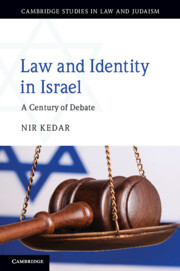Book contents
- Law and Identity in Israel
- Cambridge Studies in Law and Judaism
- Law and Identity in Israel
- Copyright page
- Dedication
- Contents
- Introduction
- Part I Seeking to Fashion National Law
- Part II The Resurgence of Cultural Conflict
- 7 Jewish Heritage and a Jewish Democratic State
- 8 The Identity Turn and the Jewish and Democratic State
- Part III Zionism, Democracy, Law, and Culture
- Conclusion
- List of Legal Cases
- Legislation
- Bibliography
- Index
7 - Jewish Heritage and a Jewish Democratic State
The Identity Discourse Returns to the Legal Debate
from Part II - The Resurgence of Cultural Conflict
Published online by Cambridge University Press: 24 October 2019
- Law and Identity in Israel
- Cambridge Studies in Law and Judaism
- Law and Identity in Israel
- Copyright page
- Dedication
- Contents
- Introduction
- Part I Seeking to Fashion National Law
- Part II The Resurgence of Cultural Conflict
- 7 Jewish Heritage and a Jewish Democratic State
- 8 The Identity Turn and the Jewish and Democratic State
- Part III Zionism, Democracy, Law, and Culture
- Conclusion
- List of Legal Cases
- Legislation
- Bibliography
- Index
Summary
Chapter 7 addresses a period beginning in the 1980s. At this time the Israeli political and legal elite drew back from its policy of avoiding issues of religion, culture and identity and once more sought to base Israeli law on Jewish content. In light of previous failures, the Knesset no longer sought to insert norms from Jewish law in its legislation. Rather, it proclaimed that Jewish values should guide legislation, court rulings, and the operation of Israeli law. The Knesset passed legislation stating that the values of “Israel’s heritage” and Hebrew law should be the residual law, that is, the general law to which judges should turn when they find no answer to the question before them in law or precedent. The actions of all state institutions were required to be consistent with the values of Israel as a “Jewish and democratic state.” Eventually, the Knesset passed a Basic Law declaring Israel as the Nation State of the Jewish People, itemizing the Jewish symbols of the state and expressing its Jewish character. The chapter describes the legislative process and the courts’ disregard for these new expressions of identity inserted into the law.
Keywords
- Type
- Chapter
- Information
- Law and Identity in IsraelA Century of Debate, pp. 101 - 133Publisher: Cambridge University PressPrint publication year: 2019



